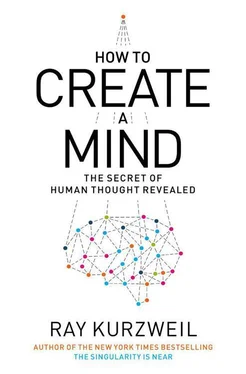1.12 For the totality of facts determines what is the case, and also whatever is not the case.
Another significant statement in the Tractatus —and one that Turing would echo—is this:
4.0031 All philosophy is a critique of language.
Essentially both Tractatus Logico-Philosophicus and the logical positivism movement assert that physical reality exists separate from our perception of it, but that all we can know of that reality is what we perceive with our senses—which can be heightened through our tools—and the logical inferences we can make from these sensory impressions. Essentially Wittgenstein is attempting to describe the methods and goals of science. The final statement in the book is number 7, “What we cannot speak about we must pass over in silence.” The early Wittgenstein, accordingly, considers the discussion of consciousness as circular and tautological and therefore a waste of time.
The later Wittgenstein, however, completely rejected this approach and spent all of his philosophical attention talking about matters that he had earlier argued should be passed over in silence. His writings on this revised thinking were collected and published in 1953, two years after his death, in a book called Philosophical Investigations . He criticized his earlier ideas in the Tractatus , judging them to be circular and void of meaning, and came to the view that what he had advised that we not speak about was in fact all that was worth reflecting on. These writings heavily influenced the existentialists, making Wittgenstein the only figure in modern philosophy to be a major architect of two leading and contradictory schools of thought in philosophy.
What is it that the later Wittgenstein thought was worth thinking and talking about? It was issues such as beauty and love, which he recognized exist imperfectly as ideas in the minds of men. However, he writes that such concepts do exist in a perfect and idealized realm, similar to the perfect “forms” that Plato wrote about in the Platonic dialogues, another work that illuminated apparently contradictory approaches to the nature of reality.
One thinker whose position I believe is mischaracterized is the French philosopher and mathematician René Descartes. His famous “I think, therefore I am” is generally interpreted to extol rational thought, in the sense that “I think, that is I can perform logical thought, therefore I am worthwhile.” Descartes is therefore considered the architect of the Western rational perspective.
Reading this statement in the context of his other writings, however, I get a different impression. Descartes was troubled by what is referred to as the “mind-body problem”: Namely, how does a conscious mind arise from the physical matter of the brain? From this perspective, it seems he was attempting to push rational skepticism to the breaking point, so in my view what his statement really means is, “I think, that is to say, a subjective experience is occurring, so therefore all we know for sure is that something—call it I —exists.” He could not be certain that the physical world exists, because all we have are our own individual sense impressions of it, which might be wrong or completely illusory. We do know, however, that the experiencer exists.
My religious upbringing was in a Unitarian church, where we studied all of the world’s religions. We would spend six months on, say, Buddhism and would go to Buddhist services, read their books, and have discussion groups with their leaders. Then we would switch to another religion, such as Judaism. The overriding theme was “many paths to the truth,” along with tolerance and transcendence. This last idea meant that resolving apparent contradictions between traditions does not require deciding that one is right and the other is wrong. The truth can be discovered only by finding an explanation that overrides—transcends—seeming differences, especially for fundamental questions of meaning and purpose.
This is how I resolve the Western-Eastern divide on consciousness and the physical world. In my view, both perspectives have to be true.
On the one hand, it is foolish to deny the physical world. Even if we do live in a simulation, as speculated by Swedish philosopher Nick Bostrom, reality is nonetheless a conceptual level that is real for us. If we accept the existence of the physical world and the evolution that has taken place in it, then we can see that conscious entities have evolved from it.
On the other hand, the Eastern perspective—that consciousness is fundamental and represents the only reality that is truly important—is also difficult to deny. Just consider the precious regard we give to conscious persons versus unconscious things. We consider the latter to have no intrinsic value except to the extent that they can influence the subjective experience of conscious persons. Even if we regard consciousness as an emergent property of a complex system, we cannot take the position that it is just another attribute (along with “digestion” and “lactation,” to quote John Searle). It represents what is truly important.
The word “spiritual” is often used to denote the things that are of ultimate significance. Many people don’t like to use such terminology from spiritual or religious traditions, because it implies sets of beliefs that they may not subscribe to. But if we strip away the mystical complexities of religious traditions and simply respect “spiritual” as implying something of profound meaning to humans, then the concept of consciousness fits the bill. It reflects the ultimate spiritual value. Indeed, “spirit” itself is often used to denote consciousness.
Evolution can then be viewed as a spiritual process in that it creates spiritual beings, that is, entities that are conscious. Evolution also moves toward greater complexity, greater knowledge, greater intelligence, greater beauty, greater creativity, and the ability to express more transcendent emotions, such as love. These are all descriptions that people have used for the concept of God, albeit God is described as having no limitations in these regards.
People often feel threatened by discussions that imply the possibility that a machine could be conscious, as they view considerations along these lines as a denigration of the spiritual value of conscious persons. But this reaction reflects a misunderstanding of the concept of a machine. Such critics are addressing the issue based on the machines they know today, and as impressive as they are becoming, I agree that contemporary examples of technology are not yet worthy of our respect as conscious beings. My prediction is that they will become indistinguishable from biological humans, whom we do regard as conscious beings, and will therefore share in the spiritual value we ascribe to consciousness. This is not a disparagement of people; rather, it is an elevation of our understanding of (some) future machines. We should probably adopt a different terminology for these entities, as they will be a different sort of machine.
Indeed, as we now look inside the brain and decode its mechanisms we discover methods and algorithms that we can not only understand but re-create—“the parts of a mill pushing on each other,” to paraphrase German mathematician and philosopher Gottfried Wilhelm Leibniz (1646–1716) when he wrote about the brain. Humans already constitute spiritual machines. Moreover, we will merge with the tools we are creating so closely that the distinction between human and machine will blur until the difference disappears. That process is already well under way, even if most of the machines that extend us are not yet inside our bodies and brains.
A central aspect of consciousness is the ability to look ahead, the capability we call “foresight.” It is the ability to plan, and in social terms to outline a scenario of what is likely going to happen, or what might happen, in social interactions that have not yet taken place…. It is a system whereby we improve our chances of doing those things that will represent our own best interests…. I suggest that “free will” is our apparent ability to choose and act upon whichever of those seem most useful or appropriate, and our insistence upon the idea that such choices are our own.
Читать дальше












